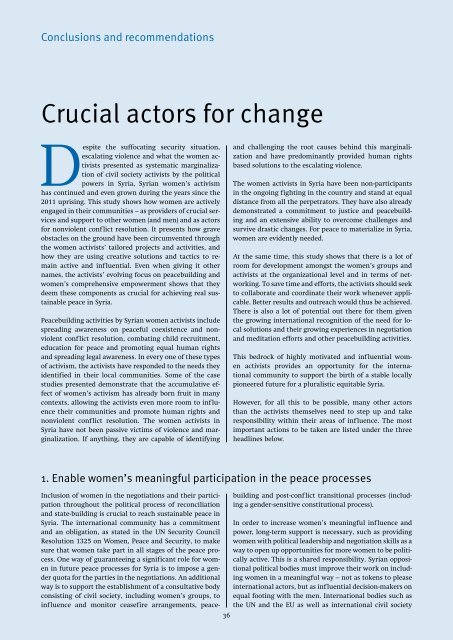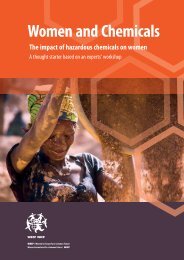future now”
YAO19
YAO19
Create successful ePaper yourself
Turn your PDF publications into a flip-book with our unique Google optimized e-Paper software.
Conclusions and recommendations<br />
Crucial actors for change<br />
Despite the suffocating security situation,<br />
escalating violence and what the women activists<br />
presented as systematic marginalization<br />
of civil society activists by the political<br />
powers in Syria, Syrian women’s activism<br />
has continued and even grown during the years since the<br />
2011 uprising. This study shows how women are actively<br />
engaged in their communities – as providers of crucial services<br />
and support to other women (and men) and as actors<br />
for nonviolent conflict resolution. It presents how grave<br />
obstacles on the ground have been circumvented through<br />
the women activists’ tailored projects and activities, and<br />
how they are using creative solutions and tactics to remain<br />
active and influential. Even when giving it other<br />
names, the activists’ evolving focus on peacebuilding and<br />
women’s comprehensive empowerment shows that they<br />
deem these components as crucial for achieving real sustainable<br />
peace in Syria.<br />
Peacebuilding activities by Syrian women activists include<br />
spreading awareness on peaceful coexistence and nonviolent<br />
conflict resolution, combating child recruitment,<br />
education for peace and promoting equal human rights<br />
and spreading legal awareness. In every one of these types<br />
of activism, the activists have responded to the needs they<br />
identified in their local communities. Some of the case<br />
studies presented demonstrate that the accumulative effect<br />
of women’s activism has already born fruit in many<br />
contexts, allowing the activists even more room to influence<br />
their communities and promote human rights and<br />
nonviolent conflict resolution. The women activists in<br />
Syria have not been passive victims of violence and marginalization.<br />
If anything, they are capable of identifying<br />
and challenging the root causes behind this marginalization<br />
and have predominantly provided human rights<br />
based solutions to the escalating violence.<br />
The women activists in Syria have been non-participants<br />
in the ongoing fighting in the country and stand at equal<br />
distance from all the perpetrators. They have also already<br />
demonstrated a commitment to justice and peacebuilding<br />
and an extensive ability to overcome challenges and<br />
survive drastic changes. For peace to materialize in Syria,<br />
women are evidently needed.<br />
At the same time, this study shows that there is a lot of<br />
room for development amongst the women’s groups and<br />
activists at the organizational level and in terms of networking.<br />
To save time and efforts, the activists should seek<br />
to collaborate and coordinate their work whenever applicable.<br />
Better results and outreach would thus be achieved.<br />
There is also a lot of potential out there for them given<br />
the growing international recognition of the need for local<br />
solutions and their growing experiences in negotiation<br />
and meditation efforts and other peacebuilding activities.<br />
This bedrock of highly motivated and influential women<br />
activists provides an opportunity for the international<br />
community to support the birth of a stable locally<br />
pioneered <strong>future</strong> for a pluralistic equitable Syria.<br />
However, for all this to be possible, many other actors<br />
than the activists themselves need to step up and take<br />
responsibility within their areas of influence. The most<br />
important actions to be taken are listed under the three<br />
headlines below.<br />
1. Enable women’s meaningful participation in the peace processes<br />
36<br />
Inclusion of women in the negotiations and their participation<br />
throughout the political process of reconciliation<br />
and state-building is crucial to reach sustainable peace in<br />
Syria. The international community has a commitment<br />
and an obligation, as stated in the UN Security Council<br />
Resolution 1325 on Women, Peace and Security, to make<br />
sure that women take part in all stages of the peace process.<br />
One way of guaranteeing a significant role for women<br />
in <strong>future</strong> peace processes for Syria is to impose a gender<br />
quota for the parties in the negotiations. An additional<br />
way is to support the establishment of a consultative body<br />
consisting of civil society, including women’s groups, to<br />
influence and monitor ceasefire arrangements, peacebuilding<br />
and post-conflict transitional processes (including<br />
a gender-sensitive constitutional process).<br />
In order to increase women’s meaningful influence and<br />
power, long-term support is necessary, such as providing<br />
women with political leadership and negotiation skills as a<br />
way to open up opportunities for more women to be politically<br />
active. This is a shared responsibility. Syrian oppositional<br />
political bodies must improve their work on including<br />
women in a meaningful way – not as tokens to please<br />
international actors, but as influential decision-makers on<br />
equal footing with the men. International bodies such as<br />
the UN and the EU as well as international civil society



